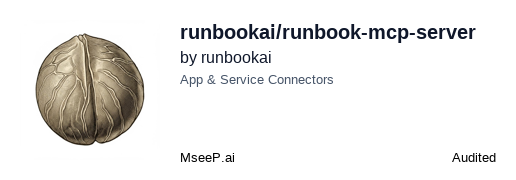<p align="center">
<img title="Runbook.AI" alt="Runbook.AI" width="20%" src="./assets/images/runbook.ai.png">
</p>
# Runbook MCP Server
Runbook MCP Server enables you to run your own runbooks from Claude Desktop.
- Run ops runbooks (e.g., deploy a service, upgrade a Kubernetes cluster)
- Run manual test plans (e.g., create a new EC2 instance, ssh into the instance, and run the integration test there).
Please watch the demo video below to understand how it works!

# How to Use
## Step 1. Start the MCP server with Claude Desktop.
Create `config.yaml`
Put the following configuration to `claude_desktop_config.json`.
```json
{
"mcpServers": {
"runbook": {
"command": "uv",
"args": [
"--directory",
"<ABSOLUTE_PATH>/runbook-mcp-server",
"run",
"runbook_server.py"
]
}
}
}
```
## Step 2. Create runbooks
You can use markdown files or text files as runbooks. See [examples](./examples-runbooks/).
We support env/var substitution.
Define `env.yaml`.
```yaml
env:
key: value
```
- `{env[key]}` is replaced with `value`.
- `{var.name}` is replaced with a variable value.
Rebuild the index when files are updated.
You can also create a new runbook, use the `create_runbook` tool. Here is an example prompt:
*Example 1*
```
Create a new runbook:
- name: list_pods
- content: List pods in all namespaces, find pods that are not ready, and send that to Slack.
You don't need to interpret the content. Please just pass it to the tool.
```
## Step 3. Run runbooks
To run a runbook, take the following steps:
1. Click "Attach from MCP" from Claude Desktop.
2. Select `get_runbook_as_prompt` from the list of integrations.
3. Pass the name of the runbook you would like to execute. Also specify variables with a comma-separated list (e.g., `var1=key1,var2=key2`).
4. Submit the generated prompt.
Then Claude Desktop will talk to other MCP servers to run the runbook.
# Example MCP Servers that can be used to Run Runbooks
- [GitHub](https://github.com/github/github-mcp-server)
- [Slack](https://github.com/modelcontextprotocol/servers/tree/main/src/slack)
- [DesktopCommanderMCP](https://github.com/wonderwhy-er/DesktopCommanderMCP)
- Web search and browser automation ([link](https://modelcontextprotocol.io/examples#web-and-browser-automation))
- Kubernetes. There are several implementations (e.g., [mcp-k8s-go](https://github.com/strowk/mcp-k8s-go))
# Development Plan
- Instead of saving the content of the runbook in the database, just save as a file. This helps easy editting. People can also
simply use GitHub for versioning.
- Runbook template X that is instantiated with given inputs.
- Maybe this is not needed. A user just needs to put additional prompts when running the runbook.
- Save executing log (for auditting and refinement)
- Remove secrets
- Also pass a past log to the runbook prompt if this helps better execution
- Approval flow.
- Add a tool `request_approval`.
- This sends a slack message to a channel.
- Then the Runbook MCP server watches the channel. If someone responds (yes / no), it proceeeds or returns an error.
- Better runbook search
- The exact name match is not great
- Registrtation to [Smithery](https://smithery.ai/server/@runbookai/runbook-mcp-server).
# Potential Work Items where its Feasibility is not clear
Note: Claude Desktop does not support "Sampling". This puts some limitations.
- Sub-runbook and reusable execution block
- Rest endpoint + frontend for managing runbooks.
- Be able to edit the runbook (with versioning)
- show an execution plan for runbook X (dry-run)
- Restrict MCP servers and tools
- convert a previous conversation into a runbook
- fine-tuning.
- Be able to refine a runbook. If there is a successful execution, save it as an example
and give it to Claude.
- Periodic execution
- Be able to provision an environment (VM, docker) for running MCP servers.
<a href="https://glama.ai/mcp/servers/p3mq5xzyof">
<img width="380" height="200" src="https://glama.ai/mcp/servers/p3mq5xzyof/badge" alt="Claude Desktop Commander MCP server" />
</a>
[](https://mseep.ai/app/runbookai-runbook-mcp-server)